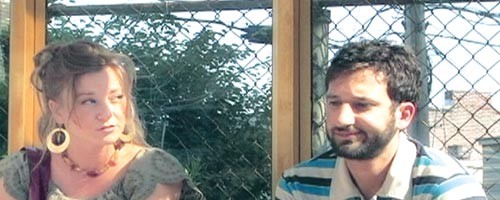Film Kitchen, the monthly screening of works by local filmmakers, doesn't have a summer season per se -- a time when cheap laughs, explosions and toy tie-ins rule the screen. That said, this month's selection of short films is entertaining, if occasionally provocative, and thus the ideal diversion for a mid-summer's eve.
The two longest films -- coming in at about 20 minutes each -- are from Justin Crimone, of Squirrel Hill; one is a documentary, the other a winsome tale of Pittsburgh's diaspora.
Shot in 2007, "Wooden But Wonderful" captures the behind-the-scenes work that brings to life the stage play, Pinocchio, at Point Park University's Playhouse Jr. Filmmaker Crimone explains that this was his "first real film," and that it began as a favor to the play's director, to help document the unique process whereby the students had total creative control over a tricky production. But after shooting 17 hours of film over five weeks, Crimone realized he had material for a documentary -- and one that mirrored his own involvement. "I could see myself growing, like Pinocchio," he recalls. "Watching the students evolve -- directing themselves, cutting down a big script -- I was in the same process as they were."
Crimone's narrative film, "Bus Stop," is an adaptation of a story written by two friends. In it, a young actress returns to Pittsburgh from Los Angeles for a family matter and rediscovers the heart of the city -- literally. Made for the Pittsburgh Neighborhood Narratives project last year, Crimone's assigned neighborhood was "Downtown." In the film, the returning native makes a new friend at the bus stop and gradually draws closer to both the city center, and -- natch -- Pittsburgh's inherent charms.
Also screening are four recent works from Marina Pfenning, of Bloomfield, that allow the viewer to explore the space (or is there?) between the normal and freakish, the mundane and nightmarish. The films have ample take-away images for pondering, whether it's wigs that drip blood, a giant costumed bunny or an imp.
"It's important for me to leave the films open to interpretation," Pfenning explains. In her latest film, "Panfilo's Pyrexia," which combines live action with stop-motion, a man ages rapidly, while his caretaker seemingly morphs from a sweet-faced woman to a ghoulish nurse from hell.
That death-nurse is portrayed by drag queen Sharon Needles, who is often featured in Pfenning's films. (In the campier sci-fi-ish "Octavia and Rose Wig Out," a missing hair-piece causes plenty of trouble.) Needles, whom Pfenning has known for five years, helps with brainstorming ideas, and is certainly a compelling screen presence.
Nils Hanczar's short animated films round out the program. Hanczar, who lives on the North Side, got interested in film while studying at Syracuse University. He grew up cartooning -- he still draws "Skeleton Balls" under the nom de plume Nils Balls -- but discovered animation at college. "I set up shop at the animation facilities," he recalls, "and did whatever I wanted."
Out of that time came "God Hates Radiation," a three-and-a-half minute wildly kinetic animated short that riffs on home and family. "Some of ["God"] is 1:1 ratio -- which I never ever want to do again," he laughs. "But that's what gives it the seizure [look], flashes and its energy."
While the essence of "God" is familiar -- there's mom in the kitchen -- don't expect a story. "Animation is so time-consuming," Hanczar explains, "that in terms of narrative, I found myself editing down to the core themes, which would be the life cycle, families and creativity." The film's vivid color blasts were another visceral outlet for Hanczar: "Color was important because in my comics I work in black and white."
Also screening is a later animated piece titled "Memry," which, like "God," takes family as its starting point. As snapshots and other footage flash by, a voiceover queries memory and its elusive, and potentially unreliable, nature: "How often do you forget, how often do you re-remember?"
With this engaging line-up, July's Film Kitchen program should add up to a memorable evening.
Film Kitchen 8 p.m. Tue., July 14 (7 p.m. reception). Melwood Screening Room, 477 Melwood Ave., N. Oakland. 412-681-9500 or www.filmkitchenpgh.org















